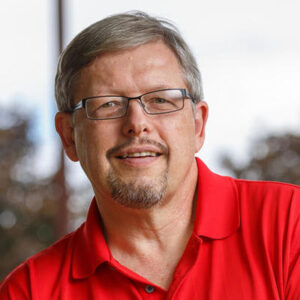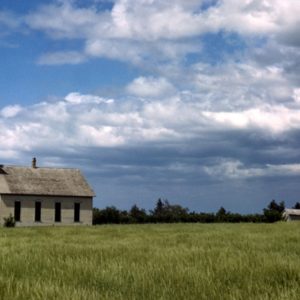Meet David Miller
David is combining his current duties as a teaching associate with the Church Leadership Center’s Journey program at AMBS with serving part time as IMC’s conference minister. Previously, David had been an Associate Professor of Missional Leadership Development at AMBS since 2009. He has pastored churches in Goshen, Indiana, in State College, Pennsylvania, and taught Bible, Theology, and Pastoral Ministry at Hesston College. He and his wife, Mary (Orrville, Ohio) live in Elkhart, Indiana and attend Prairie Street Mennonite Church. Together they are the parents of four adult children and grandparents to four grandchildren.
“I grew up in southeast Pennsylvania, the younger of two sons, in a Christian family that was deeply involved in the life and witness of St. Stephens United Church of Christ. From upper elementary school through high school I struggled significantly with the meaning of Christian faith and faithfulness particularly with relation to questions of violence. While I graduated from high school shortly after the draft for the Vietnam War had ended, struggling with the question of what I would do in response to the draft was a deep question. I had experienced from an early age a sense of call to ministry and began college saying I was preparing either to go into medicine or pastoral ministry. Interestingly, while I had grown up near the center of Franconia Mennonite Conference, I new little of the beliefs and convictions of the Mennonite Church at that time. Most of my friends who were Mennonite left the public schools when then began high school to go to Christopher Dock and with their departure I largely lost contact with them.
Halfway through college, I transferred into Goshen College through a friendship. It was here that I learned about Anabaptism and the history of the Mennonite Church. I often describe my years at GC as a spiritual homecoming, providing me the opportunity to observe and become immersed in a Christian tradition that had nearly five centuries of experience examining the questions that I had so struggled with. I no longer felt that I had to make a choice between following Jesus and being a member of a Christian church.
It was at GC that I met Mary Kathryn Schmid, while living in a household that was exploring the meaning and shape of Christian community. We became active at East Goshen Mennonite Church as students. We were married in 1978 and soon became the MYF sponsors It was during this time that I was approached by the pastor and elders to see if I experienced an inner call to pastoral ministry, as they saw in me an outward call to ministry. This congregation became a vital part of my Christian formation, healing and finally call to ministry.”
Work/Ministry Experience:
- 1980 – 81 – Youth Convention Coordinator, Bowling Green 81 Mennonite Youth Convention
- 1982 – 1985 – Assistant to the Pastor at East Goshen Mennonite Church
- 1984-1985 – Youth Convention Coordinator for Ames 85 Mennonite Church Youth Convention
- 1985 – 1988 – Director of Voluntary Service, Mennonite Board of Missions
- 1988 – 1993 – Co-Pastor East Goshen Mennonite Church
- 1993 – 1997 – Instructor in Bible, Theology and Pastoral Ministry at Hesston College
- 1997 – 2009 – Pastor of University Mennonite Church, State College, PA.
- 2009 – 2018 – Associate Professor of Missional Leadership Development at AMBS
- 2018 – Present – Teaching associate with the Church Leadership Center at AMBS
Education
- BA in Natural Science, Minor: Communication. Goshen College, 1979.
- MDiv in Pastoral Ministry. AMBS 1993.
- D.Min. in Gospel & Culture, Columbia Theological Seminary, Decatur, GA, 2006.
Additional Roles of Service
- Founding Board member – Bridgework Theater, Goshen, IN 1980 – 1985.
- Men Stopping Violence Against Women Conference, 1992.
- Founding board member of the Interfaith and Community Coalition Against Violence and Prejudice, State College, Pa 1999 – 2003
- Founder of the Centre Community Peace Team – A nonviolent riot prevention team. 2000 – 2006
- Congregational Overseer in Allegheny Mennonite Conference, 2004 – 2009,
- Christian Peacemaker Team Delegation to Israel and the West Bank, Fall 2005.
- Member of the church wide Panel for Sexual Abuse Prevention of MCUSA 2016-2018.
- Steering Committee member of Seeking the Beloved Community – a movement among Christian brothers in Elkhart to work at racial reconciliation and justice (2015 – present)



 PRESENTER: Dustin Wyse-Fisher is an educator and designer in central Illinois. He spends most of his time teaching graphic design and multimedia at an area community college. For more than a decade, he has worked as a freelance designer and printer, most recently overseeing web services at a small liberal arts college managing all aspects of the college’s online presence.
PRESENTER: Dustin Wyse-Fisher is an educator and designer in central Illinois. He spends most of his time teaching graphic design and multimedia at an area community college. For more than a decade, he has worked as a freelance designer and printer, most recently overseeing web services at a small liberal arts college managing all aspects of the college’s online presence.
 Our guest speaker is Chris Schaffner, an addiction recovery specialist who works in the area of opioid addiction. Chris is also a youth pastor, author, and conference speaker. Currently, Chris works at educating people (churches, civic groups, schools, etc.) with how best to respond to opioid addiction and how to prevent death by opioid overdose. You can explore Chris’s ministry at
Our guest speaker is Chris Schaffner, an addiction recovery specialist who works in the area of opioid addiction. Chris is also a youth pastor, author, and conference speaker. Currently, Chris works at educating people (churches, civic groups, schools, etc.) with how best to respond to opioid addiction and how to prevent death by opioid overdose. You can explore Chris’s ministry at 
